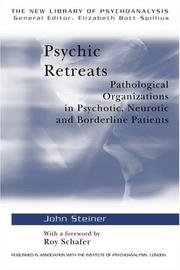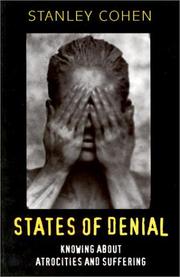| Listing 1 - 5 of 5 |
Sort by
|
Book
ISBN: 1616683775 9781616683771 9781616680947 1616680946 Year: 2010 Publisher: New York
Abstract | Keywords | Export | Availability | Bookmark
 Loading...
Loading...Choose an application
- Reference Manager
- EndNote
- RefWorks (Direct export to RefWorks)
Denial (Psychology) --- Defense mechanisms (Psychology) --- Self-deception. --- Deception --- Self-perception --- Mechanisms, Defense (Psychology) --- Mental mechanisms --- Adjustment (Psychology) --- Psychoanalysis

ISBN: 1322413584 0761906606 1452221375 9781452221373 9780761906605 9780761906612 0761906614 1452236526 Year: 1998 Publisher: Thousand Oaks, Calif. Sage
Abstract | Keywords | Export | Availability | Bookmark
 Loading...
Loading...Choose an application
- Reference Manager
- EndNote
- RefWorks (Direct export to RefWorks)
This volume presents a systematic approach to identifying and modifying client defence mechanisms in the counselling process. Examples through the book illustrate the mechanisms and therapeutic change that can result in spite of them.
Counseling. --- Defense mechanisms (Psychology) --- Mechanisms, Defense (Psychology) --- Mental mechanisms --- Adjustment (Psychology) --- Psychoanalysis --- Counselling --- Helping behavior --- Psychology, Applied --- Clinical sociology --- Interviewing --- Personal coaching --- Social case work --- Psychotherapy. --- Psychagogy --- Therapy (Psychotherapy) --- Mental illness --- Mental health counseling --- Treatment

ISBN: 1280037237 0203359836 9786610037230 0415099234 1134858035 9780415099240 0415099242 9780203359839 9780415099233 0203372395 9780203372395 9781134858033 9781134857982 1134857985 9781134858026 1134858027 9781280037238 661003723X Year: 1993 Volume: 19 Publisher: London New York Routledge
Abstract | Keywords | Export | Availability | Bookmark
 Loading...
Loading...Choose an application
- Reference Manager
- EndNote
- RefWorks (Direct export to RefWorks)
Steiner utilises Kleinian theory to analyse those patients who have organised object relationships and defences into complex, rigid internal struc- tures. Using clinical examples he examines these psychotic organisations and suggests a therapy.
Borderline personality disorder. --- Defense mechanisms (Psychology) --- Neuroses. --- Object relations (Psychoanalysis) --- Psychoses. --- Psychosis --- Psychotic disorders --- Object relations theory (Psychoanalysis) --- Neurosis --- Neurotic disorders --- Psychoneuroses --- Mechanisms, Defense (Psychology) --- Mental mechanisms --- Borderline Personality Disorder. --- Neurotic Disorders. --- Psychoanalytic Therapy --- Psychotic Disorders. --- methods. --- Psychology, Pathological --- Psychoanalysis --- Interpersonal relations --- Neuroticism --- Adjustment (Psychology) --- Personality disorders --- Defense mechanisms (Psychology). --- Object relations (Psychoanalysis). --- Methods. --- Borderline personality disorder --- Neuroses --- Psychoses

ISBN: 9780313075575 0313075573 0275973255 9780275973254 Year: 2001 Publisher: Westport, Conn. Praeger
Abstract | Keywords | Export | Availability | Bookmark
 Loading...
Loading...Choose an application
- Reference Manager
- EndNote
- RefWorks (Direct export to RefWorks)
Generation X --- Elite (Social sciences) --- Social change --- Defense mechanisms (Psychology) --- Mechanisms, Defense (Psychology) --- Mental mechanisms --- Adjustment (Psychology) --- Psychoanalysis --- Change, Social --- Cultural change --- Cultural transformation --- Societal change --- Socio-cultural change --- Social history --- Social evolution --- Baby bust generation --- Baby busters --- Gen X --- X-ers --- X generation --- Xers --- Generations --- Population --- Psychological aspects.

ISBN: 0745623921 0745616577 9780745623924 9780745616575 Year: 2001 Publisher: Cambridge Polity
Abstract | Keywords | Export | Availability | Bookmark
 Loading...
Loading...Choose an application
- Reference Manager
- EndNote
- RefWorks (Direct export to RefWorks)
Blocking out, turning a blind eye, shutting off, not wanting to know, wearing blinkers, seeing what we want to see ... these are all expressions of 'denial'. Alcoholics who refuse to recognize their condition, people who brush aside suspicions of their partner's infidelity, the wife who doesn't notice that her husband is abusing their daughter, are supposedly 'in denial'. Governments deny their responsibility for atrocities, and plan them to achieve 'maximum deniability'. Truth Commissions try to overcome the suppression and denial of past horrors. Bystander nations deny their responsibility to intervene, whether in Bosnia or Rwanda. Do these phenomena have anything in common? When we deny, are we aware of what we are doing or is this an unconscious defence mechanism to protect us from unwelcome truths? Can there be cultures of denial? How do organizations like Amnesty and Oxfam try to overcome the public's apparent indifference to distant suffering and cruelty? Is denial always so bad - or do we need positive illusions to retain our sanity? *States of Denial* is the first comprehensive study of both the personal and political ways in which uncomfortable realities are avoided and evaded. It ranges from clinical studies of depression, to media images of suffering, to explanations of the 'passive bystander' and 'compassion fatigue'. The book shows how organized atrocities - the Holocaust and other genocides, torture, and political massacres - are denied by perpetrators and by bystanders, those who stand by and do nothing.
Atrocities. --- Defense mechanisms (Psychology). --- Denial (Psychology). --- Suffering --- Violence. --- Social aspects. --- Denial (Psychology) --- Military atrocities --- Mechanisms, Defense (Psychology) --- Mental mechanisms --- Atrocities --- Defense mechanisms (Psychology) --- Human rights --- Violence --- Adjustment (Psychology) --- Psychoanalysis --- Violent behavior --- Social psychology --- Affliction --- Masochism --- Pain --- Basic rights --- Civil rights (International law) --- Rights, Human --- Rights of man --- Human security --- Transitional justice --- Truth commissions --- Cruelty --- War crimes --- Social aspects --- Law and legislation --- Human rights. --- Human Rights --- Psychology --- Social problems --- Sociology of minorities --- apartheid --- atrocities --- human rights --- minorities --- #breakthecanon --- Suffering - Social aspects --- Atrocites --- Culture --- Denegation --- Innocence --- Psychologie judiciaire --- Rationalisations --- Cruelty. --- Suffering. --- Apathy. --- Dénégation (psychologie) --- Cruauté. --- Souffrance. --- Apathie.
| Listing 1 - 5 of 5 |
Sort by
|

 Search
Search Feedback
Feedback About UniCat
About UniCat  Help
Help News
News